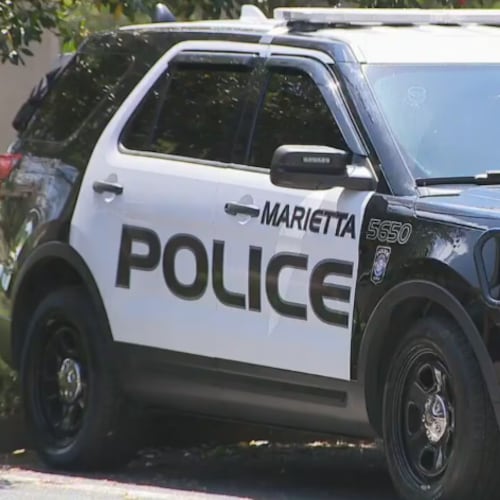Several metro Atlanta school systems are beginning the new school year with fewer resource officers than optimal, despite a national focus on keeping kids safe on school campuses.
A tight labor market for law enforcement and a surge in the number of officers needed to staff schools are the primary reasons for the shortage, districts say.
And with districts rolling out more metal detectors to find weapons, wands to inspect bags and ever bigger school buildings with multiple entry points, school leaders don’t expect their personnel struggles to abate anytime soon.
Six school systems The Atlanta Journal-Constitution looked at were short 100 or so officers, and some districts have put more focus on high schools over other grades because of thin staffing numbers.
“How do you do all this with the current personnel you have?” Clayton County school board member Benjamin Stryker asked the district’s police chief at a meeting last month during a safety discussion.
School systems, which have been on red alert since the mass shooting at Colorado’s Columbine High School in 1999, were given fresh reasons to redouble security efforts after a May 24 massacre in Uvalde, Texas. A gunman killed 19 children and two teachers at an elementary school in the small town about 85 miles from San Antonio.
Thad Johnson, a former police officer and assistant professor in Georgia State University’s Department of Criminal Justice and Criminology, said school resource officers are more important than ever because of the increasing numbers of weapons flooding the nation’s streets. That has resulted in schools creating police forces that can rival those of a small city or county, he said.
“In some cases, the pay for a resource officer is competitive with a city police department,” Johnson said.
He warned, however, that districts should be careful to not overpolice school systems, especially in Black and Latino communities that may feel already over-scrutinized by law enforcement. He also said some of the money spent on hiring officers could go to guidance counselors and mental health leaders.
Roger Tutterow, an economist at Kennesaw State University, said the challenge is finding candidates for the jobs. For every school system looking for a resource officer, there is a recruiter for a county, city, sheriff’s office and even MARTA law enforcement team seeking them too. Henry County Schools, for instance, is seeking officers at the same time that Stockbridge is recruiting candidates for the city police department it formed last year.
Schools are also competing for teachers, bus drivers, paraprofessionals and substitutes.
“There are very few sectors in the economy where human resources managers would not tell you they are having trouble filling positions, Tutterow said, explaining that the nation’s labor force has still not recovered from the coronavirus pandemic.
“Safety in schools is not widely the same issue today it was 25 years ago,” he said. “Now (school safety) goes into decisions where people locate, and how they assess the quality of schools.”
To be fully staffed, metro Atlanta districts are looking for as few as 10 school resource officers in Gwinnett County to as many as 25 or more in Henry County, school leaders revealed in school board meetings, press releases, emails and interviews with the AJC.
Some are looking to fill vacancies while others have created new jobs to beef up security.
DeKalb County school leaders said in June that they wanted to hire 22 more officers, adding to its force of 78 school resource personnel. Atlanta Public Schools leaders in late July said they planned to hire a Gang Intelligence Officer and 11 police officers to bring the district’s school resource staff to 106 officers.
Cobb County has been reluctant to share details about security measures, including its school police force. A spokeswoman said in an email, “We are always looking for highly-qualified and trained police officers to join the Cobb Schools team of 70 veteran police officers who use their 1,690 years of combined service experience to keep our students and staff safe every day.”
Gwinnett, the state’s largest school system, said it needs 10 to 20 officers to join its security department of about 98 officers and Fulton County’s school system has 72 officers with openings for 12 more. Clayton County, which had 40 school resource officers as of Aug. 1, said it wants to recruit 10 to 15 more.
“I am thinking about seeing if the board would like to recall the budget because for safety purposes I think we need to consider putting more money in the budget for the safety department,” Clayton County school board chairwoman Jessie Goree said at a recent board meeting.
One of the biggest deficits is in Henry County. The south metro community’s police department agreed in July to take over school resource officer duties after the Henry County Sheriff’s Office said it did not have the personnel to fill the necessary positions. Because of that, the district will begin class on Wednesday with resource officers only at the district’s high schools.
Henry’s middle schools will get officers in the coming months, Superintendent Mary Elizabeth Davis said. Henry’s goal is to have 43 total school resource officers, a ratio of one officer for every 1,000 students.
“Henry County PD has stood up and joined us on this journey to get to 43,” she said. “Even though we are beginning with 17 for our schools ... we are quickly growing that.”
About the Author
Keep Reading
The Latest
Featured


